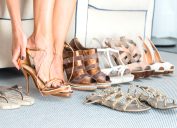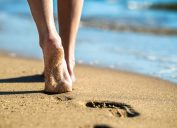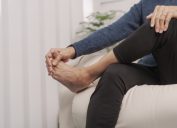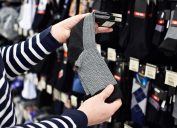3 Surprising Health Benefits to Wearing High Heels, Science Says
Contrary to popular belief, your favorite pair could bolster your well-being.
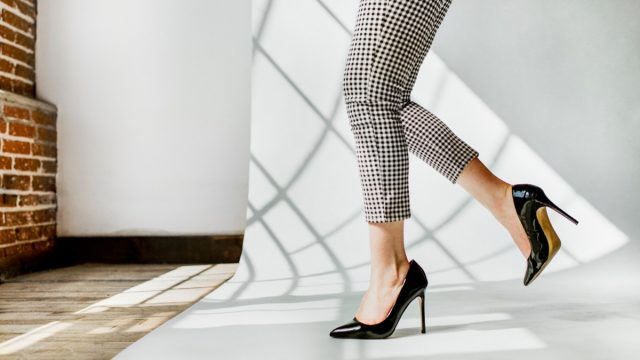
When it comes time for a formal event or just a night on the town, many of us reach for a pair of heels to elevate our look. For some, this is a fun opportunity to dress up, but for others, the idea of wearing wedges or stilettos is intimidating due to worries about discomfort or unsteadiness. But if you're in the latter camp, you may want to reconsider your footwear aversion. Several studies have revealed surprising health benefits associated with wearing high heels. Read on to find out how your pumps can better your well-being.
RELATED: 10 Best Tips for Wearing Heels Over 65 From Doctors and Style Experts.
1
They may make you a better walker.
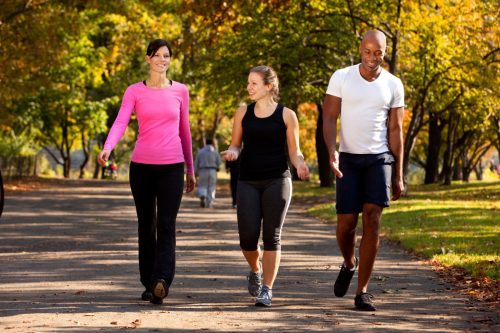
While we normally associate high heels with negative health implications, a recent study contradicts previous theories. Research published in the Journal of Applied Physiology in March found that heels can actually make you a more efficient walker.
Researchers asked a small group of men and women who'd rarely worn heels to wear a pair of Chuck Taylor All-Star Low Top sneakers that had a foam wedge attached to the sole, giving them between 2.5 and 3 inches in heel height. At the beginning of the study, the length of participants' calf muscles, as well as the stiffness in their Achilles tendons were evaluated. Researchers also noted how much energy they exerted while walking for five minutes in the Chuck Taylor heels and flat versions of the sneakers.
After a 14-week period, the study showed surprising results: Those who wore the heeled sneakers regularly exerted less energy when performing the same treadmill walking test in heels and flats—meaning they were more efficient. Those who stopped wearing the heels at the beginning of the 14 weeks didn't have any changes in energy while walking in heels or flats.
In addition, participants who wore the heels more regularly had shorter calf muscles and stiffer Achilles tendons than they did at the beginning of the study.
As lead study author Owen N. Beck, PhD, assistant professor of kinesiology at the University of Texas at Austin, told The Washington Post, these changes could be particularly beneficial for older adults. With age, Achilles' tendons often loosen up, negatively impacting walking pace. Heels could potentially counteract this, stiffening the Achilles to make walking "less effortful," Beck said.
RELATED: 10 Shoes That Are Making You Look Older.
2
They can make you a better runner.
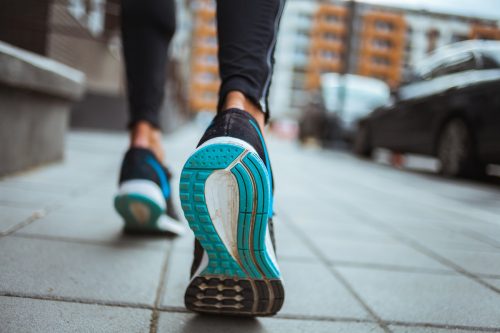
Heels may also have benefits for runners. Regarding the recent study, Beck told the WaPo that he "can see a case" for athletes putting on heels "instead of Cros" after a race or training. (A stiffer Achilles' tendon "returns more energy with each stride," meaning heels could make runners faster and more efficient, the WaPo explained.)
However, there are other factors to consider, experts conceded—and more research is necessary.
"The likelihood is that there is an optimal balance, between using heels enough to see a positive effect on movement economy but not using them too much that other negative effects, like pain, stiffer tendons, balance issues, etc., start to interfere," Neil Cronin, PhD, professor of sport and health sciences at the University of Jyvaskyla in Finland, told the WaPo. Cronin led a 2012 study that found high heels may have detrimental effects, including increased risk of strain injuries.
3
They can improve your sex life.

Research has also shown that high heels can have a positive effect on your sex life—but, surprisingly enough, it's not related to confidence.
In a 2008 letter published in European Urology, Maria Angela Cerruto, doctor, researcher, and urologist at Italy's University of Verona, cited a poster she presented at the European Association of Urology Congress in Berlin. Data on the poster looked at the effects of ankle position on pelvic floor muscle's electrical activity in women with stress urinary incontinence (involuntary, sudden loss of urine).
When researchers looked further into this issue, also evaluating continent women (those who can control their bladder) under the age of 50, they found that those who held their foot at a 15-degree angle (roughly what a 2-inch heel would create), showed 15 percent less electrical activity in pelvic muscles.
As Rock Positano, DPM, founder and director of the non-surgical Foot and Ankle Service and Joe DiMaggio Heel Pain Center at the Hospital for Special Surgery (HSS) and health columnist for the New York Daily News explained, the decreased electrical activity indicated that pelvic muscles were more relaxed when the women were wearing heels, meaning muscles were stronger and had a better ability to contract. As these muscles are directly in charge of sexual satisfaction, the decreased electrical activity and resultant relaxation could then lead to better sex.
"Women often have difficulty in carrying out the right exercises for the pelvic zone and wearing heels could be the solution," Cerruto told BBC News at the time. "Like many women, I like high-heeled shoes. It's good to know they have potential health benefits."
RELATED: I'm a Podiatrist and I'd Never Wear These 3 Pairs of Shoes.
There are some downsides you should know.
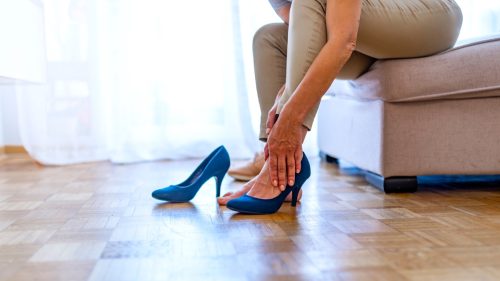
While a handful of studies have focused on the potential positives of wearing high heels, there is plenty of research on the detrimental effects, including balance issues, posture stability, and foot problems and pain. Before you decide to don a pair of stilettos with every outfit or start sporting pumps with your business casual attire, you might want to consult with your healthcare provider or podiatrist to see how heels fit into your lifestyle.
Best Life offers the most up-to-date information from top experts, new research, and health agencies, but our content is not meant to be a substitute for professional guidance. When it comes to the medication you're taking or any other health questions you have, always consult your healthcare provider directly.
- Source: Journal of Applied Physiology: Habitually wearing high heels may improve user walking economy in any footwear
- Source: Journal of Applied Physiology: Long-term use of high-heeled shoes alters the neuromechanics of human walking
- Source: European Urology: Letter to the Editor not referring to a recently published article: Women Pay Attention to Shoe Heels: Besides Causing Schizophrenia They Might Affect Your Pelvic Floor Muscle Activity!!
- Source: Frontiers in Sports and Active Living: Effects of Occasional and Habitual Wearing of High-Heeled Shoes on Static Balance in Young Women
- Source: BMC Public Health: Effects of high-heeled shoes on lower extremity biomechanics and balance in females: a systematic review and meta-analysis
- Source: BMJ Open: High-heeled shoes and musculoskeletal injuries: a narrative systematic review

